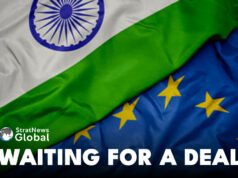NEW DELHI: The recently held summit between China and the European Union showed all too well the souring of the relationship. From the European side, the inability of Beijing to offer ‘reciprocity’ and ‘basic fairness’ when it came to opening up the Chinese market to European goods was just part of the reason why the one day virtual summit between President Xi Jinping and the EU leaders did not live up to expectations. As Velina Tchakarova, Head, Austrian Institute for European and Security Studies tells Ashwin Ahmad the problems between the two sides was seen even prior to the summit with China’s foreign minister getting a cold reception on his five-nation tour in Europe. The global pandemic, developments in Hong Kong, 5G technology have put ties into a ‘diplomatic deep freeze’. This, coupled with the fear of being squeezed in the middle of the US-China war, has made the EU more wary of dealing with China.
While certain European nations have opened up to China through the BRI, the big elephant in the room is Germany. Key to influencing attitudes of the European Union and of member nations, the role of Germany towards China will be key going forward. Germany’s increased bid to counter a more assertive China, as it becomes an economic competitor to German industrial products, has helped ensure a change in EU thinking towards Beijing as well. Josep Borrel, Vice-President of the European Commission has called China a ‘systemic rival’ rather than an ‘economic competitor’ showing the running tensions between Beijing and Brussels.
Germany’s recently released foreign policy document called the ‘Indo-Pacific Strategy’ reflects this changed attitude. Though Berlin is heavily dependent on Beijing for its supply chains, the document is signalling that Germany wants this to change and move towards the Indo-Pacific. Tchakarova has already predicted the next decade will be the ‘Indo-Pacific decade’. But what about India? Tchakarova feels that though India and the EU have a strong convergence in strategic interests – namely combatting an assertive China, there is no getting around the fact that the two sides need an FTA to move forward. She also believes that the US, albeit indirectly, may have a role to play. Increased rapprochement and convergence between the US and India in all key sectors will help lead to a strategic reorientation with the EU and India.
Traveller, bibliophile and wordsmith with a yen for international relations. A journalist and budding author of short fiction, life is a daily struggle to uncover the latest breaking story while attempting to be Hemingway in the self-same time. Focussed especially on Europe and West Asia, discussing Brexit, the Iran crisis and all matters related is a passion that endures to this day. Believes firmly that life without the written word is a life best not lived. That’s me, Ashwin Ahmad.




